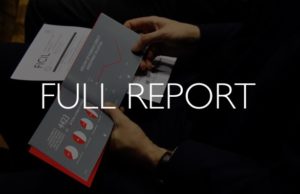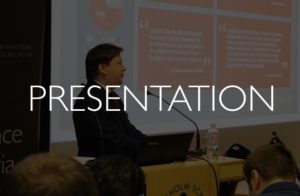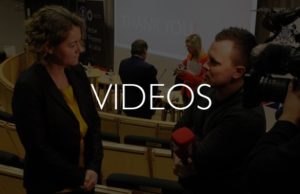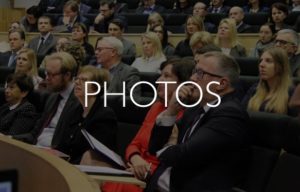In the past year, foreign investment in Latvia has increased significantly – in the first nine months of 2017, investments increased to 710 million euros. In comparison to 2016, net flows increased almost 5 times. On January 10, 2018, the Foreign Investors’ Council in Latvia presented the annual FICIL Sentiment Index 2017, which was created in co-operation with Dr. Arnis Sauka, Associate Professor at Stockholm School of Economics (SSE Riga).
The report reveals that not only the volume of foreign direct investment has increased, but also the investors’ assessment of the investment environment in Latvia. Issues that requires structural reforms to be solved for many years includes demography and labour availability and quality of higher education. Foreign investors in Latvia are concerned about the frequent changes in the tax system and legislative changes which make it difficult to plan long-term investments (in a time period over 3 years).
Marta Jaksona, Executive Director of Foreign Investors Council in Latvia (FICIL): “In general Foreign investors are more positive than in previous years. This is due to the fact that reforms have been launched in several areas (taxation, education), the economy is developing more rapidly, and investors also appreciated government’s openness towards investors. The biggest investors’ concerns are related to demography, accessibility of labour and healthcare. This is a dangerous and serious signal for politicians – continuing to ignore these problems in the labor market, it is hard to expect a steady and substantial increase of investment.”
Dr. Arnis Sauka, Associate Professor of SSE Riga, states: “The positive trend of inflow of foreign direct investment are also reflecting in investors’ positive assessment of business environment in Latvia. Overall the investment climate in Latvia has improved. In addition, the investment environment was estimated at 2.5 in 2017, and 2.0 (on the scale, where 5 is the highest rating) in 2016. In turn, the efforts made by policy-makers to improve the foreign investment environment over the past 12 months are valued with 2.9, compared to the 2016 estimate 2.3. This year, we also see improvements in some of the issues that were identified already in 2015.
The situation has improved in the field of education and science and in the way how policy makers work together and communicate with investors. However, as in previous years, with a downward trend, foreign investors are dissatisfied with the demographic situation and the availability of labour, as well as with the station in the health care. The results of the third FICIL Sentiment Index show investors’ scepticism about the positive impact of the tax reform. Foreign investors are asking policy-makers to ensure the effectiveness of the justice system, reduce bureaucracy and eradicate unethical and illegal business.”
The last year’s survey revealed that the biggest challenges faced by foreign investors in Latvia are in the field of tax policy and administration, as well as labour availability. These are still outstanding issues in 2017 too. What news will bring the year 2018? What do politicians and representatives of the ruling government promise to us?
The presentation was followed by a panel discussion with following participants: Arvils Ašeradens, the Deputy Prime Minister and the Minister for Economic Affairs, Dana Reizniece-Ozola, the Minister for Finance, Roberts Zīle, the Member of the European Parliament, and Uldis Rutkaste, the Head of the Monetary Policy Department of the Bank of Latvia. The participants of the panel discussion discussed the results of the report.
The moderator of the discussion Mārtiņš Vaivars (founder and CEO of Toneboard) together with the participants of the panel discussion, highlighted the areas in which progress was not noticeable and what steps need to be taken.
The aim of the discussion was to develop recommendations that address the issues of demography, availability and quality of labour force, the rule of law, provide a predictable and effective tax system and its administration with the aim to improve the competitiveness of the Latvian economy. The discussion about the quality of the education system was also present in the panel discussion.
Regarding the labour force, the Minister for Economy Arvils Ašeradens points out that “the acute issue is the re-qualification of labour force and the attraction of highly skilled workers in the long run. One of the solutions – increase of salary (up to 1,000-1,500 euros). Currently only 13% of the total labour force receives salary this big, the rest of the labour force can be seen as a group with potential to emigrate. While the Minister for Finance Dana Reizniece-Ozola stated that “although entrepreneurs say that there is a lack of labor force, internal resources are not being used properly. In total, 5.5 thousand work permits have been granted. 15% of these employees are highly skilled, indicating that they are still looking for “cheap hands”. Uldis Rutkaste, the Head of the Monetary Policy Department of the Bank of Latvia, emphasizes that “in the short term, the lack of work hands can be addressed through re-qualification of employees”
The next big issue is the administration of the tax system. As Dana Reizniece-Ozola emphasizes, ” over the next 3 years tax policy will not change. We have made a promise and entrepreneurs can count on it. A major reform of tax policy has been implemented and the minimum wage has significantly increased. Currently the efficiency of the State Revenue Service (SRS) and other financial institutions is on the Ministry’s agenda. It is important to note that there is a change in attitudes and thinking, for example, the SRS is increasingly focusing on cooperation with entrepreneurs, rather than punishing them for violations, but warning of potential violations and indicating how to deal with them. New changes and initiatives will be able to support existing and emerging investors more efficiently. “Arvils Ašeradens also mentions that “state structures have become business partners not punishment institutions.” Dana Reizniece-Ozola points out that there are already separate divisions specializing in corporate tax and intellectual property and these division are able to provide services to foreign investors more efficiently.
MEP Roberts Zīle looked critically at the promise of maintaining the status quo, pointing out that this is the election year and tax policy is one of the main pre-election manoeuvres. Roberts Zīle also pointed out that the amount of foreign investment will also be largely determined by the direction of Brexit.
The discussion was concluded with an exchange of views on education and science. According to the representative of the Bank of Latvia Uldis Rutkaste, “Latvian higher education institutions are fragmented, they are not competitive in international ratings.” What to do? Arvils Ašeradens said that “centres of excellence must be set up, just as it is abroad, where, for example, the Aalto University in Finland is highlighted as an innovation centre and is known both in the academic and international business environment. What would be, if instead of 56 universities, we have, for example, nine academic centres of excellence and science? ” Dana Reizniece-Ozola as a serious issue mentioned the quality of general secondary education. The current reforms to increase teachers’ salaries are an essential step to attract best teachers for students. Just like in the labour force, the key is the amount of funding and its effective administration.
It is important for the Foreign Investors Council in Latvia to promote trust between the state and the public, therefore the participants of the discussion agreed on the most important tasks for 2018 and beyond. The purpose of this work is to create the basis for further cooperation between politicians and investors.
10.01.2018.




